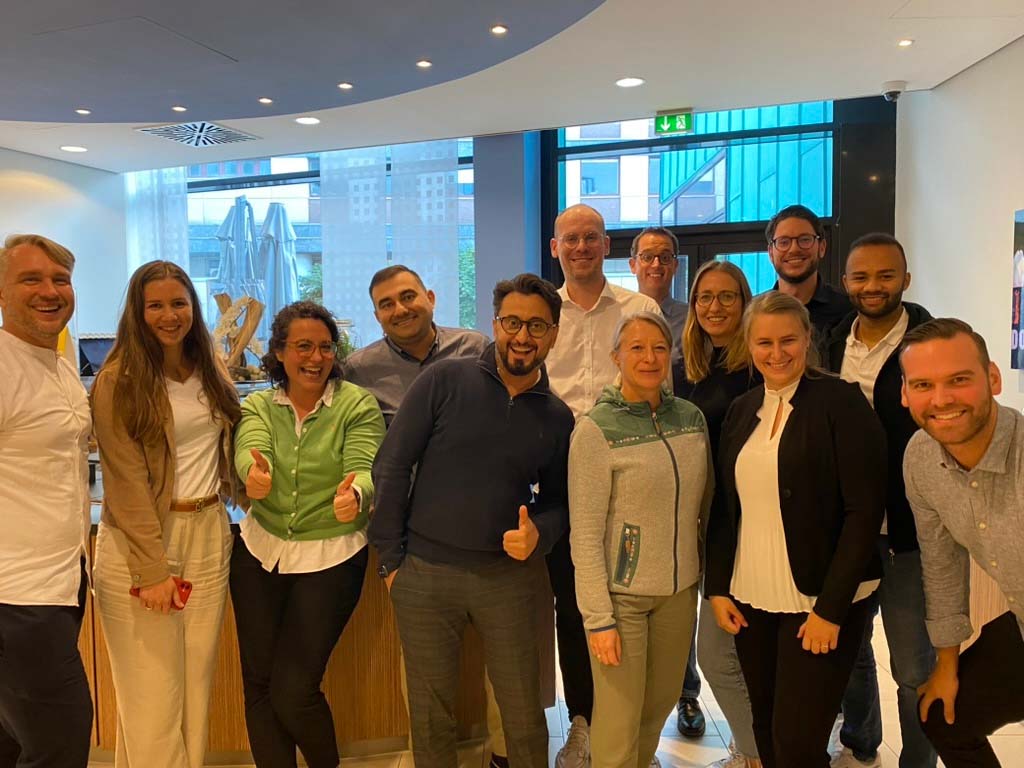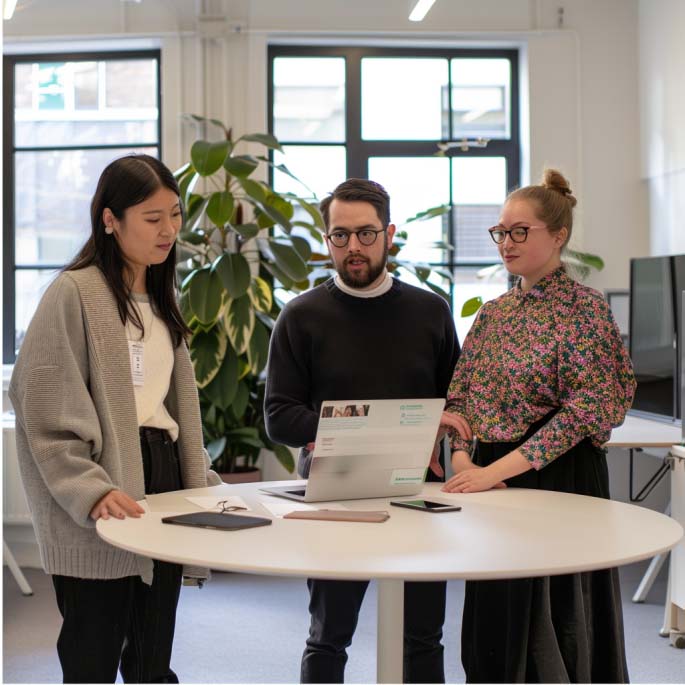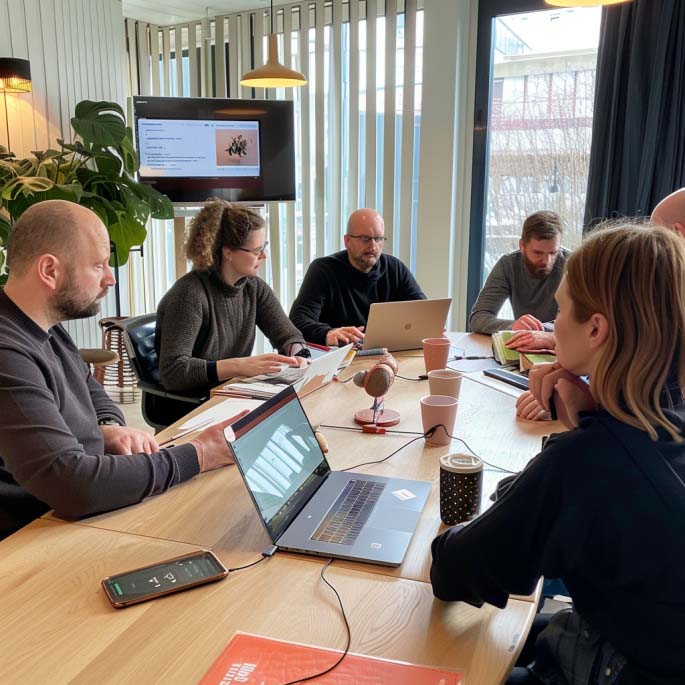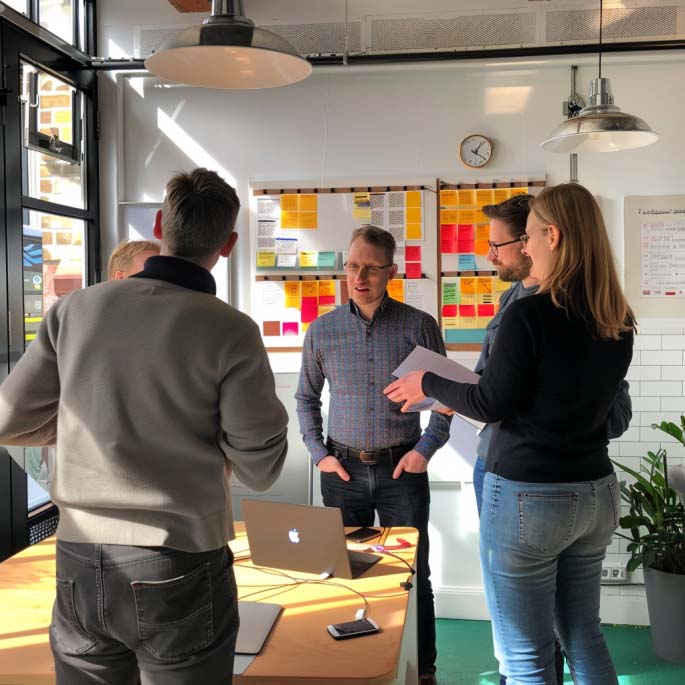Interactive seminar | Digitalization training | 4 days
Digital Transformation Manager Workshop
Learn how you can advance digitalization in your company – in a compact, interactive and intensive training course.
More than 1000 enthusiastic participants in the last 4 years





Mix of methods of the seminar
Successful digital transformation in your company
Discover important technologies such as artificial intelligence, the Internet of Things and cloud computing. Learn how to develop digital business models, effectively manage organizational change and manage projects with agility in a compact, method-rich 4-day workshop.

Lectures & impulses
Short lectures, discussions and videos with practical theories to put what you have learned into context

Methods & Exercises
Exercises to apply the methods learned and integrate them into daily work
Contents of the training at a glance

New technologies and trends
Understanding and classifying technologies and trends

Digital change management
Apply the principles of change management according to Kotter to the digital transformation.

New digital business models
Understand and apply the concepts of design methods, the value proposition and the business model canvas.

Agile project management
Get to know agile frameworks and methods, adopt an iterative way of thinking and take small steps.


Day 1: Technology
New technologies and trends
Generative AI, big data, cloud computing, exponential organization – what do these developments and technologies mean and how can you keep up with them? Learn how to develop data-based applications in a structured way.

AI & GenAI (Generative Artificial Intelligence)

Internet of Things

Big Data & amp; Cloud Computing

Data Management

Day 2: Business
New digital business models
Learn the effective business modeling tools from the startup world and bring them into your own project landscape to develop new and sustainable business models and internal processes.

WHY-HOW-WHAT: Vision, Mission

User centricity and your communication in projects

Value proposition: Benefits and unique selling points

Positioning and business modeling of today's business models

Day 3: Change
Digital change management
Learn how to effectively manage organizational change – and learn methods for dealing with resistance in the digital age, organizing stakeholder interests, viral effect, self-organization, integration of innovation in the organization through short theoretical sessions with extensive exercises and moderated discussions.

Digital change management based on Kotter

Stakeholder management and force field analysis

Strategies for dealing with resistance in digital projects

Pitch and communication in conflicts

Day 4: Agility
Agile project management
Learn how to manage digital projects agilely and efficiently. Through repeated exercises and reflection in small groups, you will learn the importance of prototyping. You will get hands-on and build and test your product.

Iterative thinking / marshmallow challenge

Agile frameworks such as Scrum & Kanban

Methods for validating hypotheses

Rapid prototyping with Miro and GenAI tools
Participant feedback from the Digital Transformation Manager seminar
Read the testimonials of other training participants on my LinkedIn profile.
Darav impressed me with his professional expertise and very likeable personality.
He managed to loosen up the tight seminar content and respond to the different levels of knowledge of the participants, bringing us closer to the digital transformation.

Klaudia R.
MVV Energie AG

He shared his many years of experience in this area with us using specific practical examples.
The various tools and the practical orientation of the seminar were great. I can only warmly recommend Darav as a digitization expert.

Alexandra K.
ROWE MINERALÖLWERK GMBH
I had the pleasure to participate in Darav’s training “Digital transformation”.
To me, Darav was not only an inspiration because of his outstanding facilitation skills but also because of his vast knowledge in the field of digitization. I learned things that since then I have been able to use on my job and in my private life.

Steffen R.
E.ON
Book the seminar as a 4-day workshop for digital transformation managers
The digitalization of processes is just the beginning! Learn how you can successfully coordinate technologies, business models, change management and agility to successfully lead the organization through the digital transformation.
Excursus on the topic of artificial intelligence - optional focus
Digitalization in the age of generative AI
I receive many requests to provide further training with a stronger focus on generative AI.
Digital transformation training can place a stronger focus on these topics:

Generative AI use cases and business models

Free tools that make your daily work easier

Security and data protection when dealing with generative AI
An interview with the Confex Training Academy on the format “Game Changer AI and digital transformation”
Die Idee entstand aus meiner langjährigen Erfahrung mit Trainings zur digitalen Transformation. In den vergangenen Jahren lag mein Fokus darauf, die rasante Veränderung von Geschäftsmodellen und unternehmerischem Handeln durch digitale Technologien aufzuzeigen und erlebbar zu machen. Dabei wurde mir bewusst, dass wir uns in unseren Übungen oft nur auf unsere eigene Intelligenz verlassen.
Mit dem Aufkommen fortschrittlicher KI-Tools haben wir nun quasi einen ständigen Sparringspartner an unserer Seite. Dieser hört uns geduldig zu, regt neue Gedankengänge an und hilft uns, unsere Ideen zu sortieren und zu reflektieren. Darüber hinaus ermöglichen diese Tools kreative Prozesse wie das Erstellen neuer Designs oder die Entwicklung von Code bis hin zu funktionsfähigen Applikationen. Dies verkürzt den Weg von der Idee zum Produkt erheblich. Diese Entwicklung wollte ich in einem neuen Seminarkonzept aufgreifen und erlebbar machen.
Lassen Sie mich das so formulieren: Nicht die KI wird Ihren Job übernehmen, sondern jemand, der effektiv mit KI umgehen kann. Das Seminar richtet sich an alle, die in ihrem Berufsalltag viel Wissen verarbeiten und Neues schaffen – also an Menschen, die häufig managen, Informationen neu kombinieren und komplexe Probleme lösen müssen.
Interessanterweise habe ich bisher keinen einzigen Teilnehmer erlebt, der nach dem Training sagte, es sei für ihn nicht relevant gewesen. Das unterstreicht die breite Anwendbarkeit und Wichtigkeit des Themas in der heutigen Arbeitswelt.
Das Training lässt sich in vier Hauptbereiche gliedern:
- Überblick über aktuelle Trends und Technologien: Wir schauen uns an, welche Entwicklungen es gibt und wie man den Überblick behalten kann.
- Kontinuierliche Analyse und Hinterfragung von Geschäftsmodellen: Hier nutzen wir moderne Managementmethoden, um bestehende Modelle zu überprüfen und anzupassen.
- Psychologische und menschliche Aspekte von Veränderungsprojekten: Wir untersuchen, wie man die Dynamiken in Changeprozessen versteht und sinnvoll nutzen kann.
- Priorisierung und agiles Projektmanagement: Im letzten Teil geht es um die effektive Priorisierung von Projektzielen und die Anwendung agiler Methoden und iterativen Denkens.
Alle diese Bereiche werden in Kleingruppen simuliert und praktisch durchgespielt, wobei wir durchgehend KI-Modelle als Unterstützung einsetzen.
Unser Ansatz ist sehr praxisorientiert. Nach jedem thematischen Abschnitt folgt eine praktische Übung, gefolgt von einer Reflexionsphase. Hier diskutieren wir, wie das Gelernte in reale Projektsituationen übertragen werden kann.
Ein Kernaspekt unseres Trainings ist die durchgängige Simulation. Diese schafft eine viel größere Praxisnähe, als man es von klassischen Seminaren oder Workshops zur Digitalisierung kennt. Die Teilnehmer erleben direkt, wie sich theoretische Konzepte in konkreten Szenarien anwenden lassen und welche Herausforderungen dabei auftreten können.
Tatsächlich bin ich regelmäßig – etwa alle zwei Wochen – von einem neuen Tool begeistert. Die rasante Entwicklung im Bereich der Large Language Models (LLMs) eröffnet ständig neue Möglichkeiten. Persönlich nutze ich täglich ChatGPT und Claude. Die Qualität der Ergebnisse, die Zeitersparnis und die Verbesserung meiner Arbeiten durch diese Tools beeindrucken mich immer wieder aufs Neue.
Kürzlich hat mich auch die KI-Funktion bei Miro sehr positiv überrascht. Im Seminar werden wir eine Vielzahl weiterer spezialisierter Tools kennenlernen, und ich freue mich schon darauf, die begeisterten Reaktionen der Teilnehmer zu sehen.
Meine größte Motivation sind die Reaktionen der Teilnehmer. Es ist faszinierend zu beobachten, wie sich anfängliche Skepsis in Begeisterung verwandelt. Das ungläubige Kopfschütteln und das Leuchten in den Augen, wenn die Teilnehmer die Möglichkeiten erkennen.
Besonders motivierend finde ich auch den Enthusiasmus, mit dem die Teilnehmer nach dem Seminar zurück in ihre Unternehmen gehen. Sie sind hochmotiviert, die Digitalisierung ihrer Prozesse und die Transformation ihrer Organisation aktiv anzugehen. Diese nachhaltige Wirkung zu sehen, treibt mich immer wieder an.
Interessanterweise hat sich in meinem letzten Training eine Erkenntnis herauskristallisiert, die so nicht explizit in der “Seminarausschreibung” steht. Die Teilnehmer realisierten, dass trotz der ständigen Flut neuer Tools und Technologien – die durchaus zu einem Gefühl der Überforderung führen kann – die grundlegenden Management- und Changemethoden konstant bleiben.
Sie lernen, diese bekannten Methoden in einem neuen Kontext anzuwenden, sei es im Bereich Design Thinking oder klassisches Change Management. Gleichzeitig wird ihnen bewusst, dass der Fokus mehr denn je auf den Menschen liegt. Soziale Dynamiken, Selbstreflexion, Selbstfürsorge und kontinuierliches Lernen als Teil der Agilität gewinnen an Bedeutung.
Konkret entwickeln die Teilnehmer Fähigkeiten im Umgang mit KI-Tools, lernen moderne Managementmethoden kennen und verbessern ihre Kompetenz im Bereich Change Management und agiler Arbeitsweisen.
Eine zentrale Herausforderung ist, dass viele Unternehmen und Führungskräfte die transformative Kraft dieser Tools für den Arbeitsalltag unterschätzen. In meinem persönlichen Umfeld sehe ich, wie unentbehrlich diese Technologien für viele geworden sind.
Gleichzeitig fehlt es vielen Unternehmen an einer klaren Strategie für den Umgang mit KI und für die Befähigung ihrer Mitarbeiter. Eine weitere Herausforderung liegt im Erlernen des Umgangs mit diesen Tools. Es braucht Ausdauer, ständiges Ausprobieren und das Erlernen der “Prompt-Sprache”, um das volle Potenzial auszuschöpfen.
In unserem Seminar adressieren wir diese Herausforderungen direkt. Wir zeigen die praktischen Anwendungsmöglichkeiten auf, diskutieren Strategieansätze und geben den Teilnehmern die Möglichkeit, hands-on Erfahrungen mit verschiedenen Tools zu sammeln. So bereiten wir sie darauf vor, als Multiplikatoren in ihren Unternehmen zu wirken und den Wandel aktiv zu gestalten.
